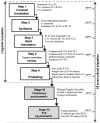Cross-Cultural Adaptation and Validation of the Spanish HLS-COVID-Q22 Questionnaire for Measuring Health Literacy on COVID-19 in Peru
- PMID: 40805937
- PMCID: PMC12346109
- DOI: 10.3390/healthcare13151903
Cross-Cultural Adaptation and Validation of the Spanish HLS-COVID-Q22 Questionnaire for Measuring Health Literacy on COVID-19 in Peru
Abstract
Background/Objectives: The social importance of health literacy (HL) is widely understood, and its measurement is the subject of various studies. Due to the recent pandemic, several instruments for measuring HL about COVID-19 have been proposed in different countries, including the HLS-COVID-Q22 questionnaire. The diversity of cultures and languages necessitates the cross-cultural adaptation of this instrument. Thus, the present study translates, adapts, and validates the psychometric properties of the HLS-COVID-Q22 questionnaire to provide its cross-cultural adaptation from English to Spanish (Peru). Methods: As part of ensuring that the final questionnaire accommodates the cultural nuances and idiosyncrasies of the target language, the following activities were carried out: (a) a survey of 40 respondents; and (b) a focus group with 10 participants, followed by expert approval. In addition, the validity and reliability of the health instrument have been ascertained through a further pilot test administered to 490 people in the city of Tacna in southern Peru. Results: The resulting questionnaire helps measure HL in Peru, aiding better-informed decision-making for individual health choices. Conclusions: The presence of such a tool is advantageous in case of similar global health emergencies, when the questionnaire can be made readily available to support a promotion of strategies towards better self-care. Moreover, it encourages other Latin American stakeholders to adjust the instrument to their own cultural, language, and socio-economic contexts, thus invigorating the regional and global expansion of the HL study network.
Keywords: COVID-19; Peru; Spanish; cross-cultural adaptation; health literacy; pandemic; psychometric properties.
Conflict of interest statement
The authors declare no conflicts of interest.
Figures





Similar articles
-
Prescription of Controlled Substances: Benefits and Risks.2025 Jul 6. In: StatPearls [Internet]. Treasure Island (FL): StatPearls Publishing; 2025 Jan–. 2025 Jul 6. In: StatPearls [Internet]. Treasure Island (FL): StatPearls Publishing; 2025 Jan–. PMID: 30726003 Free Books & Documents.
-
Spanish and Catalan Versions of the eHealth Literacy Questionnaire: Translation, Cross-Cultural Adaptation, and Validation Study.J Med Internet Res. 2024 May 10;26:e49227. doi: 10.2196/49227. J Med Internet Res. 2024. PMID: 38728072 Free PMC article.
-
Sexual Harassment and Prevention Training.2024 Mar 29. In: StatPearls [Internet]. Treasure Island (FL): StatPearls Publishing; 2025 Jan–. 2024 Mar 29. In: StatPearls [Internet]. Treasure Island (FL): StatPearls Publishing; 2025 Jan–. PMID: 36508513 Free Books & Documents.
-
Signs and symptoms to determine if a patient presenting in primary care or hospital outpatient settings has COVID-19.Cochrane Database Syst Rev. 2022 May 20;5(5):CD013665. doi: 10.1002/14651858.CD013665.pub3. Cochrane Database Syst Rev. 2022. PMID: 35593186 Free PMC article.
-
The measurement of collaboration within healthcare settings: a systematic review of measurement properties of instruments.JBI Database System Rev Implement Rep. 2016 Apr;14(4):138-97. doi: 10.11124/JBISRIR-2016-2159. JBI Database System Rev Implement Rep. 2016. PMID: 27532315
References
-
- Sørensen K., Van Den Broucke S., Fullam J., Doyle G., Pelikan J., Slonska Z., Brand H., (HLS-EU) Consortium Health Literacy Project European Health literacy and public health: A systematic review and integration of definitions and models. BMC Public Health. 2012;12:80. doi: 10.1186/1471-2458-12-80. - DOI - PMC - PubMed
-
- Bas Sarmiento P., Fernández Gutiérrez M., Poza Méndez M., Pelicano Piris N.P. Propuestas de evaluación de la Alfabetización en Salud. Psych. Lat. 2015;6:1–11.
-
- Málaga G., Cuba-Fuentes M.S., Rojas-Mezarina L., Romero-Albino Z., Hamb A., Paz-Soldan V.A. Estrategias para promover la alfabetización en salud desde la atención primaria: Una perspectiva que considera las realidades de los países de ingresos medios y bajos. An Fac. Med. 2019;80:372–380. doi: 10.15381/anales.803.16864. - DOI
Grants and funding
LinkOut - more resources
Full Text Sources
Research Materials

